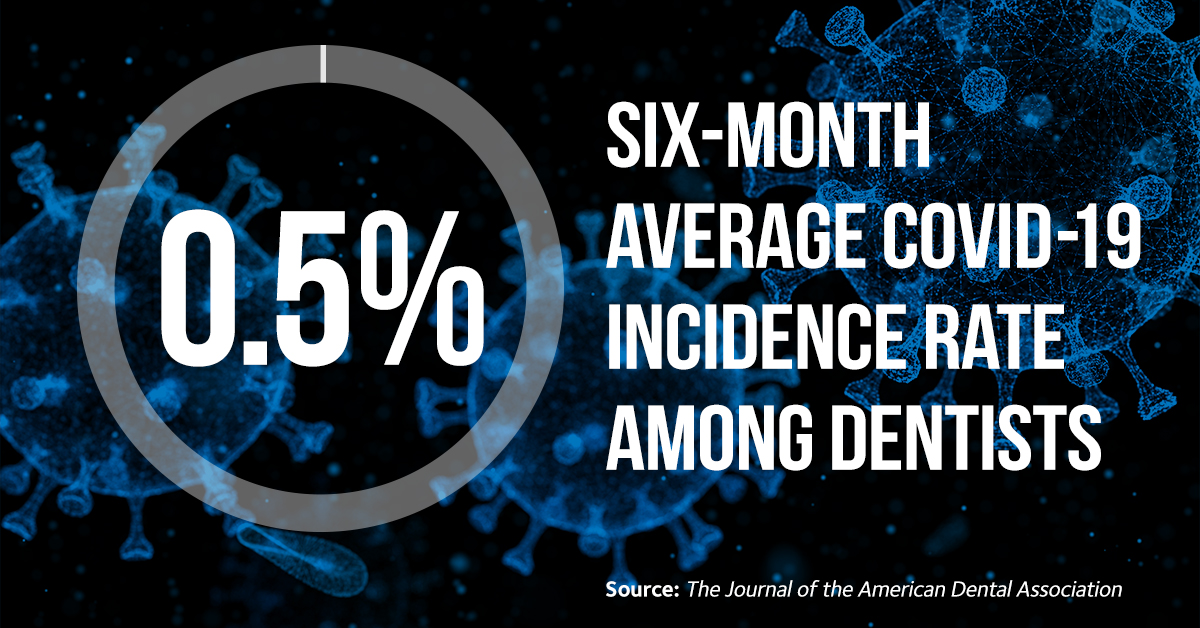COVID-19 infection rate among dentists remains lower than other health professionals

"COVID-2019 Among Dentists in the United States: A 6-Month Longitudinal Report of Accumulative Prevalence and Incidence," published in the June issue of The Journal of the American Dental Association , is based on online survey data collected June 8-Nov. 13, 2020, from 2,196 U.S. dentists in private practice or public health about the COVID-19 testing they received, the symptoms they experienced and the infection prevention procedures they followed in their primary practice.
Dentists' COVID-19 incidence rates ranged from 0.2% to 1.1% each month, and the average incidence rate over the six months was 0.5%.
"We're pleased to see that dentists have demonstrated continued low monthly incidence of disease despite several regional and national COVID-19 rate spikes during the study period," said Marcelo Araujo, D.D.S., Ph.D., CEO of the ADA Science & Research Institute, chief science officer of the ADA and senior author of the report.
In May 2020, a survey of U.S. front-line health care workers, including nurses and physicians, found their reported COVID-19 prevalence rate to be 29%.
The ADA study is a continuation of the first large-scale report of U.S. dentists' COVID-19 infection rates and infection control practices published in October 2020 by JADA. The results were weighted according to age and location to approximate all U.S. dentists.
Of the initial 2,196 respondents, 1,291 participated in the final survey and 785 participated in all six. Fifty-seven dentists total reported ever receiving a COVID-19 diagnosis. The likely source of COVID-19 was identified via contact tracing by a health agency or clinic in 23 of those cases, with the dental practice identified as the likely infection source in two instances.
Because many dental procedures generate aerosols, practicing dentistry was originally believed to present a high risk of transmitting SARS-CoV-2 to dental professionals. During the study period, the rate of dentists performing aerosol-generating procedures increased from 92.8% in the first month to 98.4% in the last.
At least 99.7% of dentists said they used enhanced infection prevention and control strategies in their practice each month. A large number of dentists reported screening patients and staff for COVID-19, disinfecting between patient appointments and encouraging social distancing among patients.
"This study shows high rates of pre-appointment screening of patients and appropriate infection control measures throughout the study period, demonstrating that adhering to very strict protocols for enhanced infection control helps protect their patients, their dental team and themselves," Dr. Araujo said.
Strategies to optimize personal protective equipment supplies, such as not changing masks after each patient appointment, were encouraged by the Centers for Disease Control and Prevention when supplies were limited. Over the course of the study, dentists' use of these strategies decreased, as more changed their masks with every patient. After the first month, during which 17.6% reported changing their masks between patients, the rate never fell below 25.5% in subsequent months.
"This study reinforces that the dental care sector is up and running safely," said Marko Vujicic, Ph.D., chief economist and vice president of the ADA Health Policy Institute. "Nowhere is this proof point more evident than by the fact that more than 90% of patients surveyed indicate they have already visited the dentist or soon will."
In addition to Drs. Araujo and Vujicic, the other study authors included researchers from the ADA Science & Research Institute and Health Policy Institute, as well as Mia L. Geisinger, D.D.S., with the University of Alabama at Birmingham, and Effie Ioannidou, D.D.S., with the University of Connecticut and the ADA Council on Scientific Affairs.
The authors plan to further research what helps and hinders dentists when it comes to wearing PPE according to CDC recommendations and how well different levels of PPE use and infection control procedures protect against COVID-19.
To read the full article online, visit JADA.ADA.org. For more COVID-19 resources from the ADA, visit ADA.org/virus .
Other articles in the June issue of JADA discuss apical periodontitis and Type 2 diabetes mellitus, the COVID-19 infection rates in people seeking dental care and dental evacuation system use in reducing aerosols.
Every month, JADA articles are published online at JADA.ADA.org in advance of the print publication.



